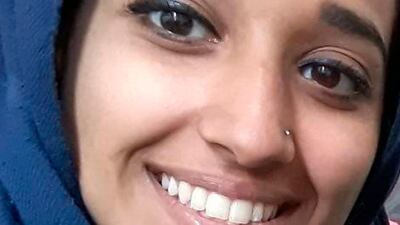A US-born woman of Yemeni descent who joined ISIS will not be allowed to return to the country because she is not a citizen, US Secretary of State Mike Pompeo said on Wednesday.
Mr Pompeo said Hoda Muthana, the daughter of a former Yemeni diplomat, “is not a US citizen and will not be admitted".
“She does not have any legal basis, no valid US passport, no right to a passport, nor any visa to travel to the US,” he said.
Ms Muthana was a 20-year-old student when she left Alabama in 2014 and travelled to Syria to join ISIS. She has a toddler son from one of her three marriages to members of the extremist militant group and now lives in a displacement camp in Syria. She has also been appealing through media outlets to return to the US with her child, and says she “deeply regrets” joining ISIS.
President Donald Trump tweeted that it was on his instructions that Ms Muthana was being refused entry to the US.
“I have instructed Secretary of State Mike Pompeo, and he fully agrees, not to allow Hoda Muthana back into the Country!”
Mr Trump's refusal to admit Ms Muthana comes just days after he urged European states to take back their citizens who had joined ISIS fighters.
The campaign to admit Ms Muthana back into the United States is backed by the Florida branch of the Council on American-Islamic relations (CAIR). It tweeted that Ms Muthana wanted to help in de-radicalisation efforts. CAIR is designated as terrorist organisation by the UAE.
Ms Muthana's fate hinges on whether she can establish that she is a US citizen. Previous reporting had indicated she is a dual American and Yemeni citizen, but Mr Pompeo's statement said that she is not. New York Times reporter Rukmini Callimachi, who interviewed Ms Muthana this week, said the ISIS recruit had two US passports, one from her birth and one to flee in 2014.
Her legal team as Ms Callimachi reported now believes the US government is using a loophole to deny her citizenship, and therefore legal rights, because her father was a Yemeni diplomat.
The US generally grants citizenship to everyone born on its soil and Ms Muthana is believed to have travelled to Syria on a US passport.
But a US official said a later investigation showed that she had not been entitled to her passport, adding: "Ms Muthana's citizenship has not been revoked because she was never a citizen."
Ms Muthana's father had been a diplomat from Yemen and, under the Immigration and Nationality Act, a person born in the US to an accredited foreign diplomatic officer is not subject to US law and is not automatically considered a US citizen at birth.
Ms Muthana's lawyer, Hassan Shilby, showed a birth certificate that demonstrated she was born in New Jersey in 1994 and said her father had ceased being a diplomat "months and months" before her birth.
"She is a US citizen. She had a valid passport. She may have broken the law and, if she has, she's willing to pay the price," Mr Shilby told Agence France-Presse.
"We cannot get to a point where we simply strip citizenship from those who break the law. That's not what America is about."
Shortly after leaving the US, Ms Muthana posted on Twitter a picture of herself and three other women who appeared to torch their western passports, including an American one.
Last weekend, Mr Trump chastised European allies that have not taken back hundreds of ISIS prisoners in Syria, where US-backed local forces have recaptured vast areas of the north-east from the militants.
By comparison, the Counter Extremism Project at George Washington University has identified only 64 people who left the US to join ISIS.
Ms Muthana has said she was brainwashed by social media messages and went to Syria without her parents' knowledge.
Shortly afterwards, she posted on Twitter a picture of herself and three other women who appeared to torch their western passports, including an American one.
She went on to post calls on social media to kill Americans, glorifying the ruthless extremist group notorious for its beheadings that for a time ruled vast areas of Syria and Iraq.
"To say that I regret my past words, any pain that I caused my family and any concerns I would cause my country would be hard for me to really express properly," she said in a handwritten note to her lawyer.
The US decision on Ms Muthana comes amid rising debate in Europe on the nationality of extremists. Britain recently revoked the citizenship of Shamina Begum, who travelled to Syria as a teenager to join ISIS and now wants to return to her country of birth.
Britain asserted that she was entitled to Bangladeshi citizenship due to her heritage, but the Dhaka government on Wednesday denied that she was eligible, leading her to become effectively stateless.
US citizenship is significantly more difficult to lose. The 14th Amendment to the US Constitution, ratified in 1868 after the Civil War as slavery was abolished, establishes that anyone born in the country is a citizen with full rights.

